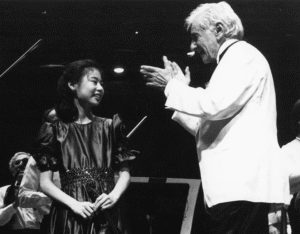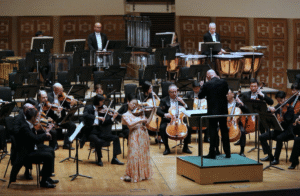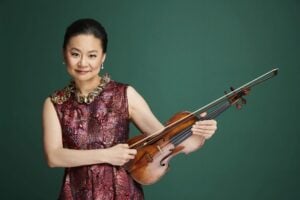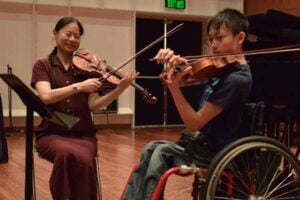Midori: From Violin Prodigy to Music Activist and Educator
Violinist Midori, praised as a visionary artist, activist and educator, is returning to Hong Kong for two performances including a recital and a concert with Hong Kong Sinfonietta on 27 and 29 November: HKS Recital Series: Midori Violin Recital and Great Violin Concertos: Midori Plays Mendelssohn.
Ahead of the concerts, we had the chance to chat in depth with Midori about the importance of music education, and the programme highlights of her concerts.
Born in 1971 in Osaka, Japan, Midori began her violin studies at the age of 3 with her mother, professional violinist Setsu Goto. In 1982, she moved to New York City with her mother. The very same year, conductor Zubin Mehta invited her to perform with the New York Philharmonic in the orchestra’s annual New Year’s Eve concert. She was only 11.
In 1986, her performance at the Tanglewood Music Festival with Leonard Bernstein became legendary. During the concert, she broke the E string on her violin, then again on the concertmaster’s Stradivarius. She finished the performance with the associate concertmaster’s Guadagnini and received a standing ovation. The next day, her performance made the front page of The New York Times: “Girl, 14, Conquers Tanglewood with 3 Violins”.

Midori and Leonard Bernstein after her historic performance at Tanglewood in 1986. (photo: Walter Scott/Boston Symphony Orchestra Archives)
Soon after at age 15, Midori began playing the violin professionally, and made her Carnegie Hall recital début aged 19. Starting out as a celebrated child prodigy, she quickly established herself as one of the world’s most sought-after violinists, who has enjoyed an illustrious career spanning four decades and counting.
When in her 20s, freed of the pressure of being a prodigy, Midori started to forge a more “normal” life. While continuing to perform, she studied psychology at NYU — she considered it as an alternative career for a while — and began her “mission” to work with children. She founded several non-profit organisations dedicated to music education in the past three decades. Since then, Midori has been recognised as a dedicated music educator as well as a community engagement activist. She has been making an impressive impact as a teacher and a philanthropist as well.
“I have been committed to musical community engagement since 1992, when I founded my first nonprofit organisations, Midori & Friends and Music Sharing. I strongly believe that music can bring people together, and that this serves an important purpose in our world today and for the future. My activities bring me into contact with individuals who may have fewer opportunities to experience live performing arts, while teaching professional-track violin students at competitive conservatories.What others might see as separate components of my professional life are, for me, parts of one unified whole, with each endeavour flowing naturally into the next. Together, these activities shape a musical and professional life of relevance and meaning,” Midori explains.
In her recital on 27 November, she will perform with pianist Ieva Jokubaviciute some exquisite chamber works, including Beethoven’s “Spring” Sonata for Piano & Violin; Schubert’s Fantasie for Violin & Piano in C; Poulenc’s Sonata for Violin & Piano; the Three Romances for Violin & Piano by both Robert and Clara Schumann; and Schubert’s Rondo Brillante in B minor for Violin & Piano.
“Programmes are always chosen in collaboration with my pianist and we always seek both cohesiveness and contrast. This time, our programmes span nearly 150 years of violin and piano repertoire, united by lyricism, songlike expression and balance between intimacy and brilliance. Both Beethoven and Schubert are at a crossroad between the Classical and the Romantic eras. For Beethoven, inner emotional world becomes central, while Schubert carries this even further towards Romantic expressivity. After the intermission, we will perform Poulenc’s Sonata, written in the 1940s, dedicated to the memory of Garcia Lorca. The piece has a more angular, contrasting, modern character. From Poulenc, we will move to the romances written by Robert and Clara Schumann. Robert’s romances are reflective, intimate and inward-looking, while Clara’s are more exuberant and bold. Finally, Schumann’s Rondo Brillante bursts outward lively, sparkling and joyful,” Midori explains in detail.

Midori and Christoph Eschenbach with the Tongyeong Festival Orchestra (featuring musicians from Hong Kong Sinfonietta) in Hong Kong, 2018.
For her concerto on 29 November, she will perform Mendelssohn’s exquisite Violin Concerto in E minor under the baton of Daniel Raiskin, Designated Chief Conductor and Artistic Director of the Janáček Philharmonic Orchestra. Tchaikovsky’s monumental Symphony No 6 and a young Shostakovich’s Scherzo will complete what promises to be a breathtaking programme of beloved masterpieces and extraordinary fireworks.
More details about the concerts can be found here:
27 November: HKS Recital Series: Midori Violin Recital
29 November: Great Violin Concertos: Midori Plays Mendelssohn

